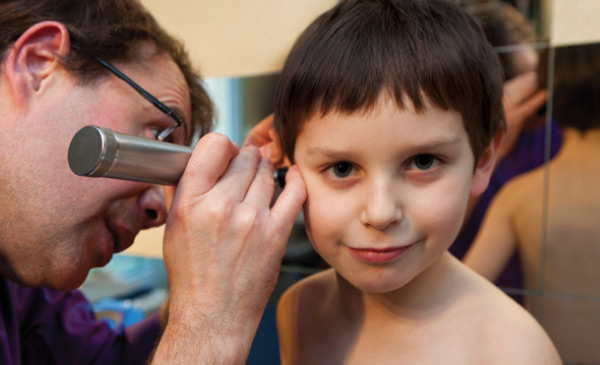Children have a tendency to be vulnerable to ear and throat infections. For one thing, their ear passages are shorter and more horizontal than those of adults – this makes it easier for fluids to be trapped in the middle ear and germs can easily breed there. Once infected, their weaker immune systems will have a tougher time overcoming this invasion. Since the middle ear is located in a central location with regard to the nasal passages and throat, the germs can easily spread to these and other parts of your child’s body.
Identifying ear infections
Always stay vigilant, especially with babies and young children, as they are normally unable to communicate their distress. The symptoms of an ear or throat infection may not always be easy to detect. Some of the symptoms that may indicate an infection include:
- Babies that cry more than usual, especially when he is lying down
- If your child has trouble sleeping, breathing, or hearing
- There is fluid coming from his ears
- If he has a fever or complains of a headache

Most common ear infections do not require medication unless it is severe or it happens in young infants. Your child’s immune system can usually handle these infections, and many paediatricians are advocating a ‘wait-and-see’ approach instead of prescribing antibiotics at the first sign of infection. By all means, bring your child to see a doctor if you are unsure, but be prepared to be asked to observe him for 48 to 72 hours by your paediatrician. Depending on the severity, your paediatrician may prescribe ear drops and suggest over-the-counter pain relievers during this observation period.
Throat infections
The most common cause of sore throats is a viral infection which often does not require any specific medication, and most children typically recover within a few days. Sore throats may also be caused by bacteria.
Sore throats are often accompanied by a cold and/or cough (caused by excess mucous in the throat). Coughing is the body’s way of clearing phlegm or mucous in the back of the throat. In fact, there is nothing to worry about as long as he is feeding, drinking, eating, and breathing normally. However, if he has a bad cough that persists, is breathless, has a high fever, or is unable to swallow fluids or saliva, see your paediatrician immediately.
Falling sick is ‘normal’
Since there are so many different types of viruses and bacteria that can cause your child to ‘catch a cold’, it could be considered ‘normal’ for him to catch a cold eight or more times in a year. As his body’s immunity builds up, he will fall sick less and less often. Most colds will clear up within five to seven days, but there are a few simple things you should do to ease the cold-symptoms:
- Make sure he drinks adequate fluids. If he has a stuffy/blocked nose, you can use saline sprays/drops to help loosen/dilute any nasal secretions. Do not use nasal decongestants for more than five days as it may worsen the stuffiness.
- If he has a slight fever or complains of pain or discomfort, medicines containing paracetamol or ibuprofen may be administered according to the manufacturer’s directions (the dosage will vary for children of different ages). However, if he suffers from a high and/or prolonged fever, see a doctor immediately.
- Hygiene is important! Get everyone in the family to wash hands with soap regularly – this helps prevent the cold from spreading.
Preventing infections
As parents, there are a few things you can do to minimise the chances of your child suffering from ear and throat infections:
- Avoid exposure to second-hand smoke – this has been proven to be a significant contributor to childhood illnesses, including ear and throat infections. If you are a smoker, consider quitting smoking as doing so will benefit both you and your child’s health.
- Practise proper hygiene – bad hygiene will result in your child being exposed to more bacteria. Teach him to wash his hands frequently to prevent the spread of disease-causing germs.
- Keep your child’s vaccinations up to date – vaccinating your child helps his immune system. Speak with your paediatrician to learn more about the different vaccines that will protect your child.
- Breastfeed – make sure your child is breastfed during the first 2 years of his life. Breast milk contains various anti-infective factors and helps to boost his immune system, thus allowing his body to better fight bacterial or viral infections.
An educational contribution by Malaysian Paediatric Association.






Comments